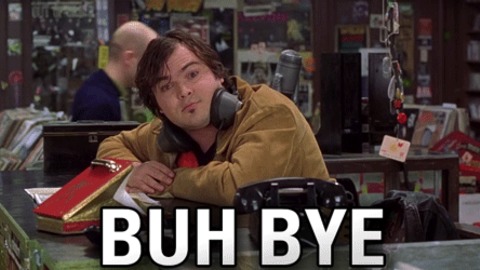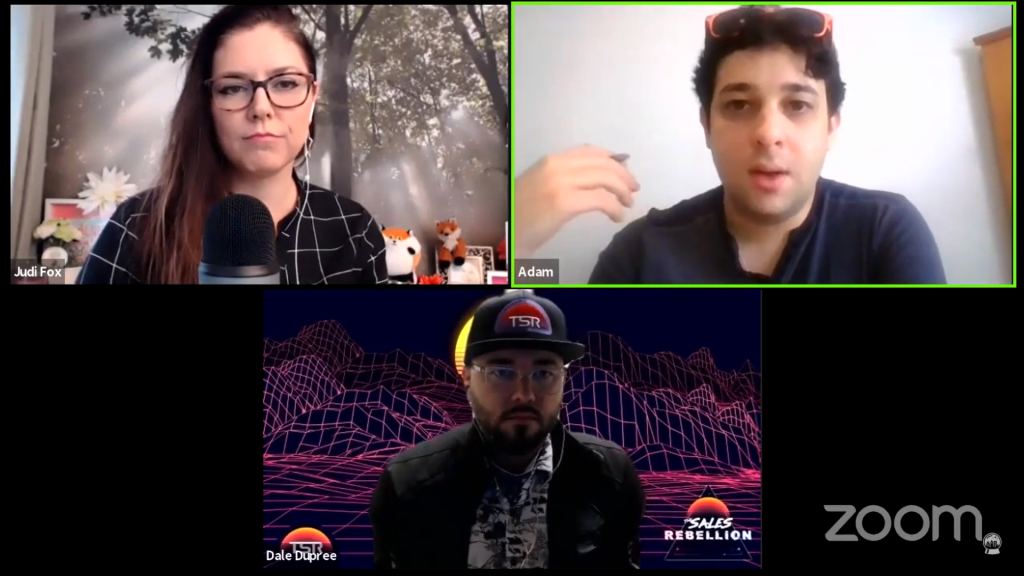
TL;DR
This is the somewhat brief story of how a few tweets led to an incredible summer of helping to build and launch TechStars’ Atlanta inaugural Startup Week.
I’ve made it as short as possible without skimping on the details of the people who made this all doable. I included the other team captains as well, though to detail their respective speakers would certainly take a further article.
For me, though, I tried to give a full rundown and sampling of what the Tech/Fintech track put together for that week, including promo graphics and links to (most of!) the videos—the last few should be uploaded soon!
Sorry the TL;DR was still long anyway lol. 😆🚀
A Few Tweets
In October of last year, I found myself at OTT Fest here in Atlanta, tweeting about some of the great presentations and speakers I was seeing that week. It was before Covid turned our lives upside-down—hard to remember, I know—and at the time, I couldn’t have seen where it would lead. In fact, the biggest surprise at the time was that some of my tweets eventually led to winning a Roku by accident.
But one of the other happy side-effects of my tweets was running into Aly Merritt of SalesLoft in the same hashtag conversations of the event. Being a film-oriented event, most people were engaging with Instagram or Tik Tok as opposed to Twitter. We struck up a brief conversation first in the comments, and then via DM, discussing the things we enjoyed about the event from the techie angle. After the day was over, I mentioned we should keep the dialogue going. We did, meeting for coffee a couple weeks later—again, pre-Corona—discussing tech startups and whatnot. Then the year ended and we agreed to circle back in 2020.
Getting the Call
In February of this year, just as I was back from Colorado and before the pandemic would turn the world on its head, Aly and I hopped on a zoom call; I thought to talk more about the Atlanta tech scene. Aly, however, had a unique and totally unexpected proposition for me. Under the covers at the time, she was working with TechStars Atlanta to help launch their first Startup Week and lead the Tech/Fintech track. The work was definitely a two-person job, though, and she mentioned she wanted to bring me in as a co-captain to work together if I was interested.
So…was I interested?
I didn’t have to be asked twice—how could I pass up an opportunity like this? Especially one that seemed to come so out of the blue.
Later on in the conversation, she mentioned her reasoning:
“You have a massive network on Twitter and on LinkedIn—I told TechStars that could bring some incredible value.”
An hour later at dinner, I had to take a mental step back and reflect on where the hell I was compared to the start of the day and how the hell I’d gotten there.
That morning, I’d hoped that our scheduled zoom call would lead to another; one consistent conversation at a time is my networking philosophy. Methodical and consistent value creation and authenticity—that’s what had built prior relationships and what would build this one. Instead—or perhaps, in addition to..?—I was now working on a long-term project for TechStars, co-captaining with one of the best networkers in the Atlanta tech scene (which she still is!). All of which had seemingly dropped in my lap as a result of some tweets months ago and a reputation that I hoped was growing, but never thought at the time had expanded so far.
Why do I harp on this?
Because the proof is in the pudding, as my mom would say. Relationships take time and patience. And life is relationships.
Because even when Covid hit hard and required us—all the team captains, TechStars, sponsors, and potential speakers—to reevaluate and roll with the punches, we found a way to pull together and put on a phenomenal program. Sometimes unexpected things throw initial plans out the window, but when you’re working with talented and determined people, you find ways to create positive value all around.
Before I go any further, I want to make special mention of Kylan Kester (Lead Organizer), Eli Becerril (TechStars contact), De’Havia Stewart (Track Captain Lead), and Ronan Roche (TechStars contact) who were our conduits at TechStars and who all did an incredible job helping Aly & myself (and all the other track captains!) coordinate to put on a fantastic event.
So we—and all the other team captains and TechStars folks—worked through the summer against a new November deadline. To their credit, the behind-the-scenes people at TechStars reworked the entire backend of the program to go 100% virtual. So often we don’t think about the amount of work that goes into that reworking, but coming from the music world I know what it looks like behind the curtain to get a show done right, so kudos to the team there.
Goals & Breakdown
Working with Aly, we put together what I considered to be a truly exciting and bang-up list of speakers. Importantly, and absolutely worth mentioning, one key thing that Aly and I set out to do from day one was construct a speaker list that reflected what we both believe that tech should (and does) look like; that means we made a conscious effort to have a diverse set of panels and perspectives. I’m immensely proud to have had a hand in creating panels that heavily represented female founders/VCs as well as those who identify as POC. Next year I hope we can outdo ourselves and bring in even more diverse groups and perspectives.
Let me take a quick aside and mention that I’m no statistician, so there are numerous cross-demographics at play here which I’m frankly not gifted in statistics enough to properly record.
For the entire Tech/Fintech track, we broke down as:
50% male; 50% female (!)
70% white; 30% POC — This is clearly an area that we can & will do better on next year.
Interestingly enough, though, of the POC demographic, 62% were women of color.
Were we perfect? No. But will that dampen our drive to continue to do better? Also no; we’re more driven every day. Why am I spending time to break down some simple numbers? Because unless we have the conversations about our goals and where we are, we never get to where we should be.
Diversity builds better businesses.
The Rundown
Monday
For the Tech/Fintech track, we divided the week into daily themes: HR & Legal (Monday), Media & PR (Tuesday), Funding & Partnering (Wednesday), Design & Development (Thursday), and Branding & Marketing (Friday). And damn if I’m not proud of the programming blocks we were able to put together. TechStars was good enough to record all of the live panels & talks, and you can watch them below!
**(We’re still waiting for 3 more to be edited & uploaded, including the panel I ran on Tuesday, so I’ll be sure to update as soon as I have those too!)
What’s the Big Idea?: Navigating Common Intellectual Property Challenges
Featuring: Rusty Close (Troutman Pepper)
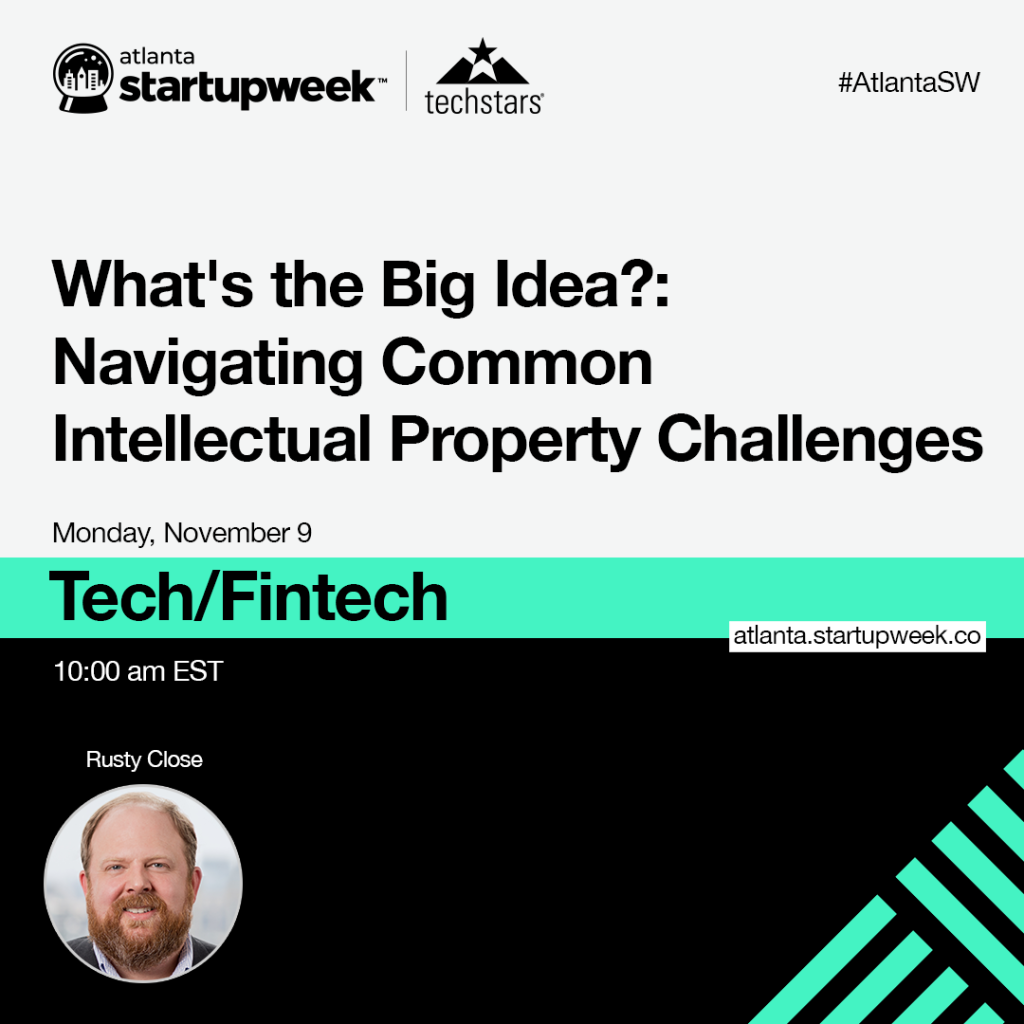
On Monday, November 9th, we kicked it off in the morning with Rusty Close of Troutman Pepper discussing intellectual property law and patents within the context of the startup world. He did a terrific job underscoring how IP should be handled from the outset. Often it’s the intellectual property factor which can lead to a dispute between cofounders and potentially lead to an implosion, and Rusty’s talk discussed great ways to try to preempt this headache.
Dead on Arrival: Avoiding Legal Mistakes That Could Kill Your Startup
Featuring: Jack A. Donenfeld (Boomtown Accelerators)
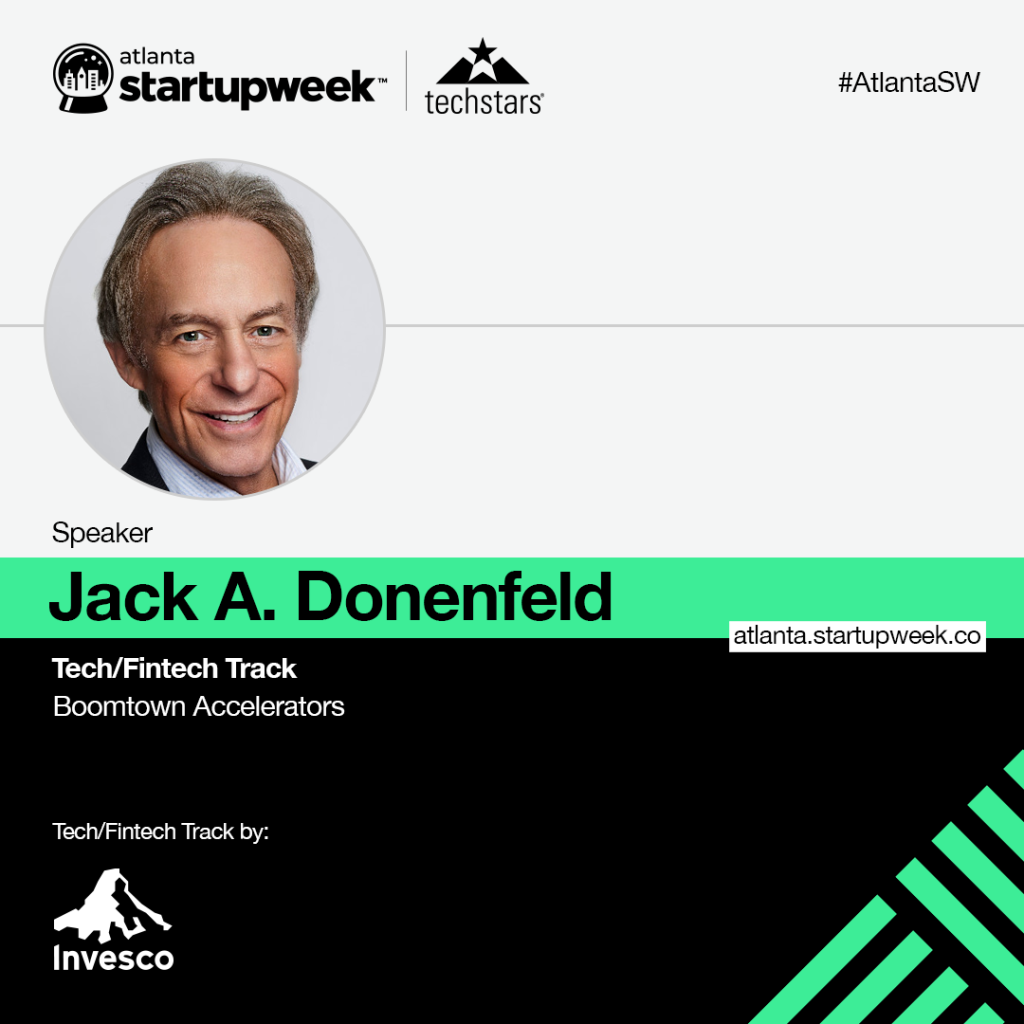
Then we had Jack A. Donenfeld from Boomtown Accelerators discuss some of the common pitfalls that startups should be aware of and avoid. Jack gave an awesome & detailed powerpoint presentation on some of the legal mistakes that he sees daily in his work with startups. Some of Jack’s suggestions are so critical precisely because they are seemingly so common, and his guidance was a great addition to Monday’s schedule!
HR Empowerment: The Cost of Good Company Culture
Featuring: Stefanie Jewett, moderator (Activvely; formerly CNN), Jeannie Marx (Marx & Marx, LLC), & Elaine Jacques (Executive coach & LinkedIn influencer; formerly Frito-Lay)
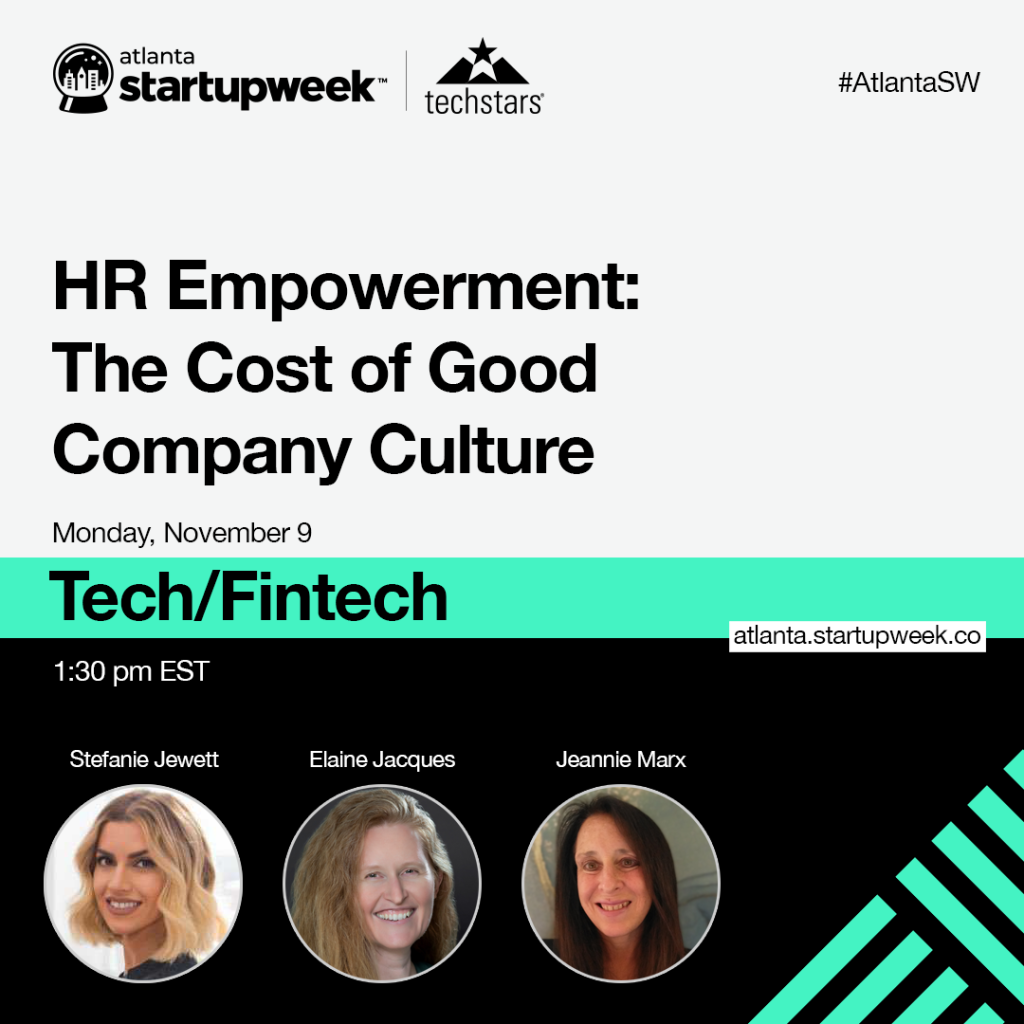
We wrapped up Monday with a killer panel which I heard got immensely positive feedback. Moderated by my good friend Stefanie Jewett—well-known here in Atlanta—and featuring LinkedIn influencer Elaine Jacques as well as my own Mom, Marx & Marx partner Jeannie Marx, this afternoon panel discussed the cost of good company culture, especially when the murky waters are difficult to navigate. Elaine and my Mom broke down some of the most common situations that often go unaddressed by HR and how to address them so you don’t end up on the opposite side of the table from my parents’ firm in a sexual harassment or discrimination lawsuit. We talk so much in tech about good company culture; this is how we ensure that we walk the talk.
Tuesday
Tuesday, November 10th was no less busy. We had a spirited discussion in the morning with some of the biggest names in tech journalism and I had an awesome time leading my own panel in the afternoon around networking & reputation-building.
Almost Famous: How Tech Journalists Determine the Companies on Their Radars
Featuring: Mike Murphy, moderator (Protocol; formerly Quartz), Alex Wilhelm (TechCrunch editor; formerly Crunchbase News & Mattermark), Mary Ann Azevedo (FinLedger; formerly Crunchbase News), & Jason Rowley (Golden; formerly Crunchbase News & Mattermark)
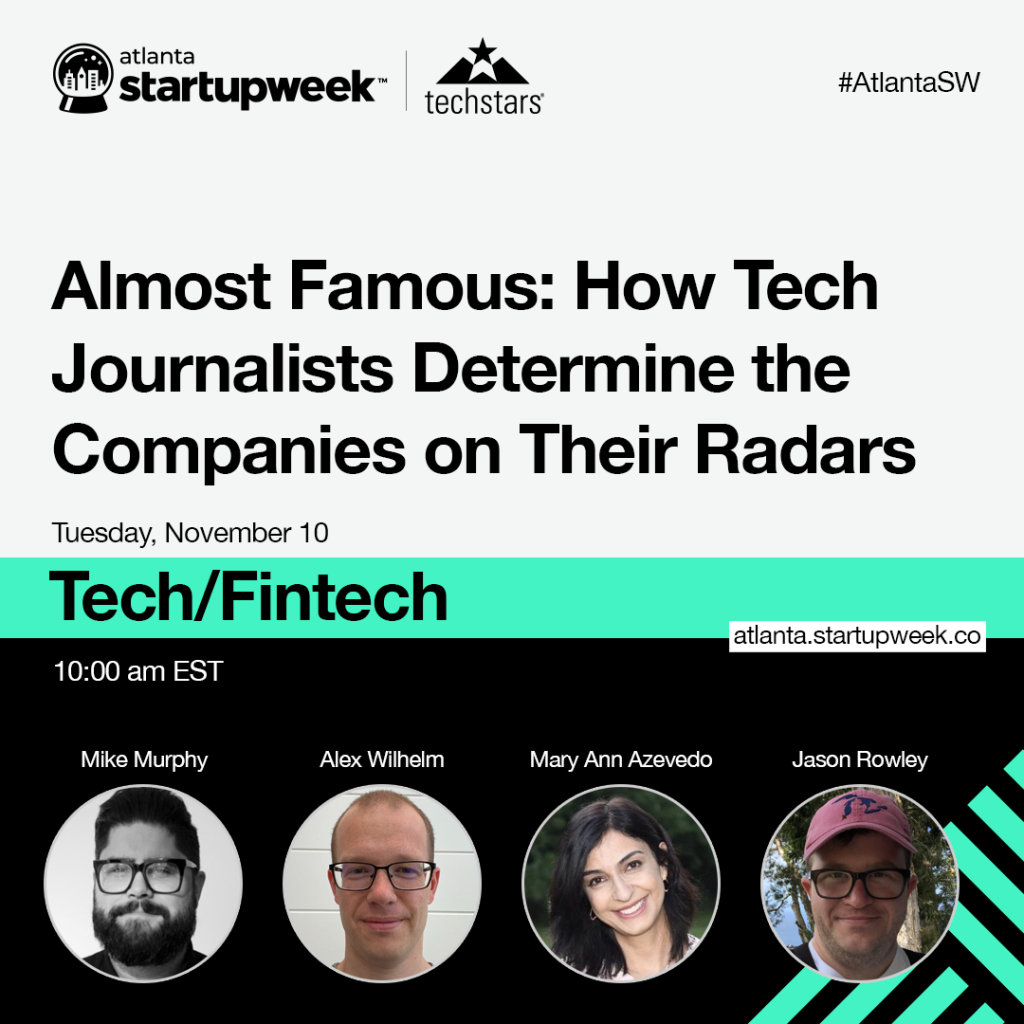
As a writer and sometimes-journalist myself, I always wonder how my peers determine the companies that they like to keep on their radars. Yes, there are always the big companies with their newest fundraises, but I wanted to know how a smaller company might creep onto a journalist’s radar—and how it could stay there. This panel began as a question in my mind as to how new founders might be able to approach tech journalists in more mutually beneficial ways.
Brick by Humble Brick: Building an Influential Network from Scratch
Featuring: Adam Marx (me 😄), moderator (The Zero to One Networker; formerly CEO at Glipple; Crunchbase News, Mattermark, & Startup Grind), Cory Warfield (ShedWool, CorryConnects, & LinkedIn influencer), Kate Atwood (LoCo+, Kate’s Club, & OTT Fest), & Jake Tital (Sproutways).
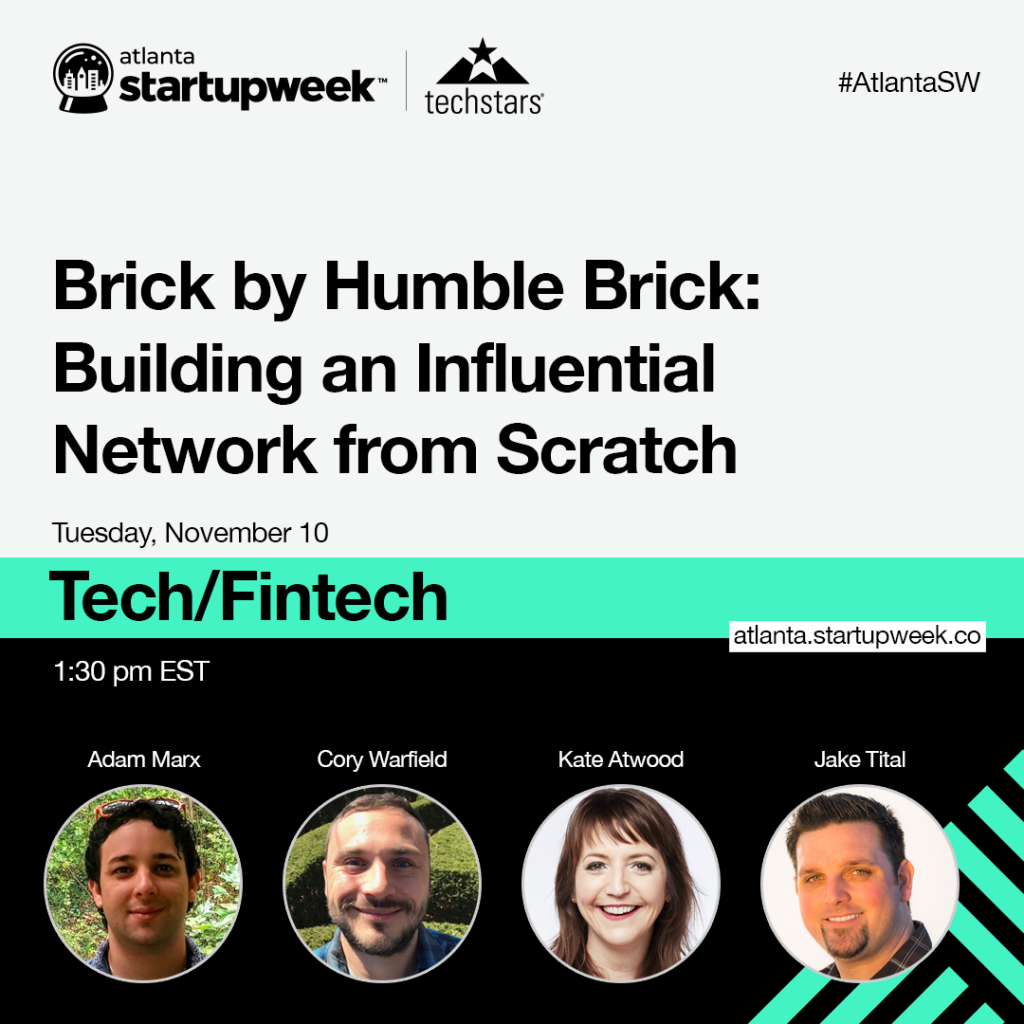
I hear so much discussion about how to properly (or not) develop a good network and if accelerators are necessary in doing so. For the record, I think accelerators are a fantastic resource and they certainly facilitate a number of the strategies. But for people who don’t have access to that option, there are indeed ways to construct a broad and influential network from scratch. In this panel, I talked with a number of influencers—and close friends!—about how strategies like patience, humility, and value creation can really build concrete networks seemingly out of nothing. In effect, this is how I built my network in tech and what the concept of the Zero to One Networker is all about!
Wednesday
Wednesday, November 11th began with a bang and we heard some amazing viewpoints from fundraising and IPO experts all day. Our panelists included some of the most well-known names in Atlanta tech, both on the funding side and the founder side!
The IPO Show
Featuring: Kunbi Tinuoye, moderator (UrbanGeekz; Advisory Board at CES and SXSW) & Barrett Daniels (IPO expert; formerly SoftBank & Next Step IPO)
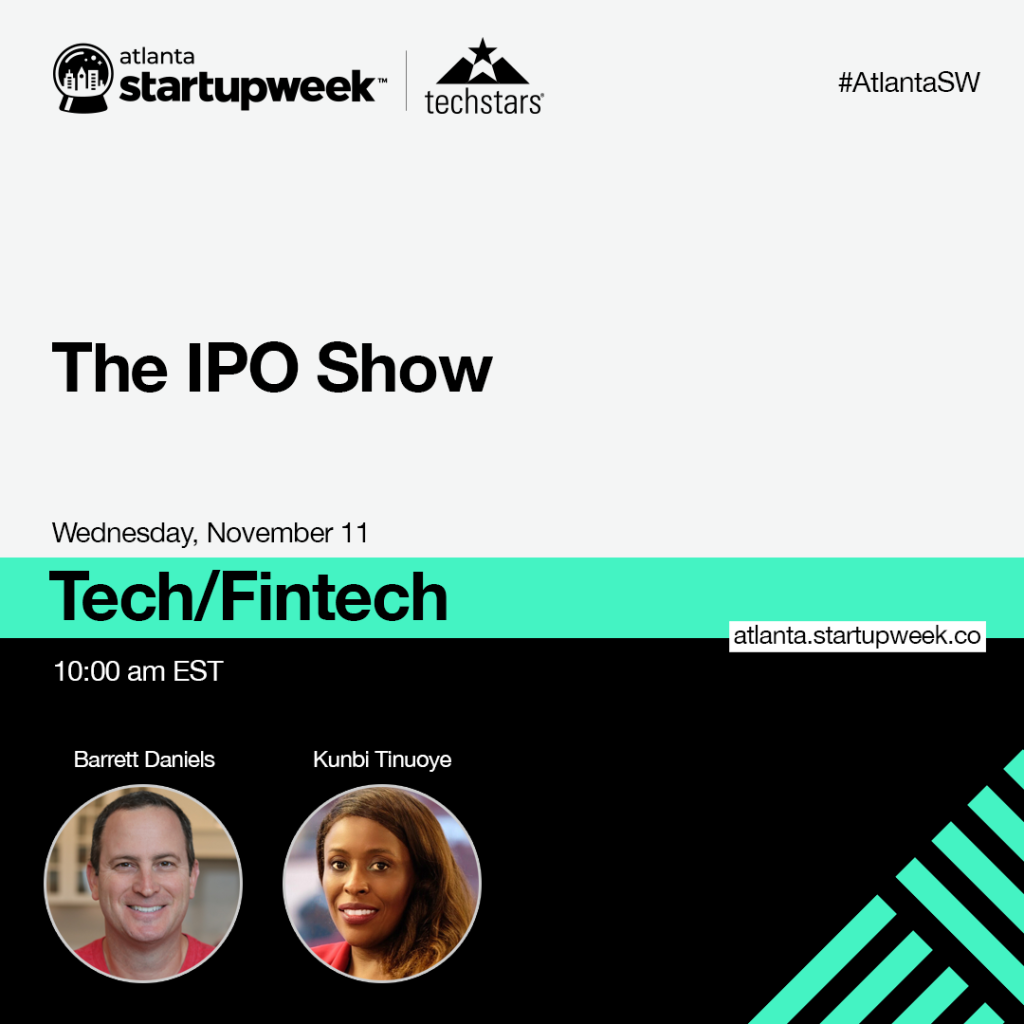
Out of the gate we talked IPOs and pro/con assessments. Kunbi and Barrett had a killer discussion on the whole IPO process, breaking down some of the mystique and weighing if and when it’s actually a good idea. In startups we’re so often faced with news of impending IPOs that it behooves us to take a step back every once and a while and assess whether it really is the right strategy for our companies. Some of the perspectives dropped here are must-hear perspectives on the IPO reality.
Building a $1B+ Enterprise: The Story of SalesLoft
Featuring: Holly Beilin, moderator (EngageVC; formerly Hypepotamus) & Kyle Porter (SalesLoft)
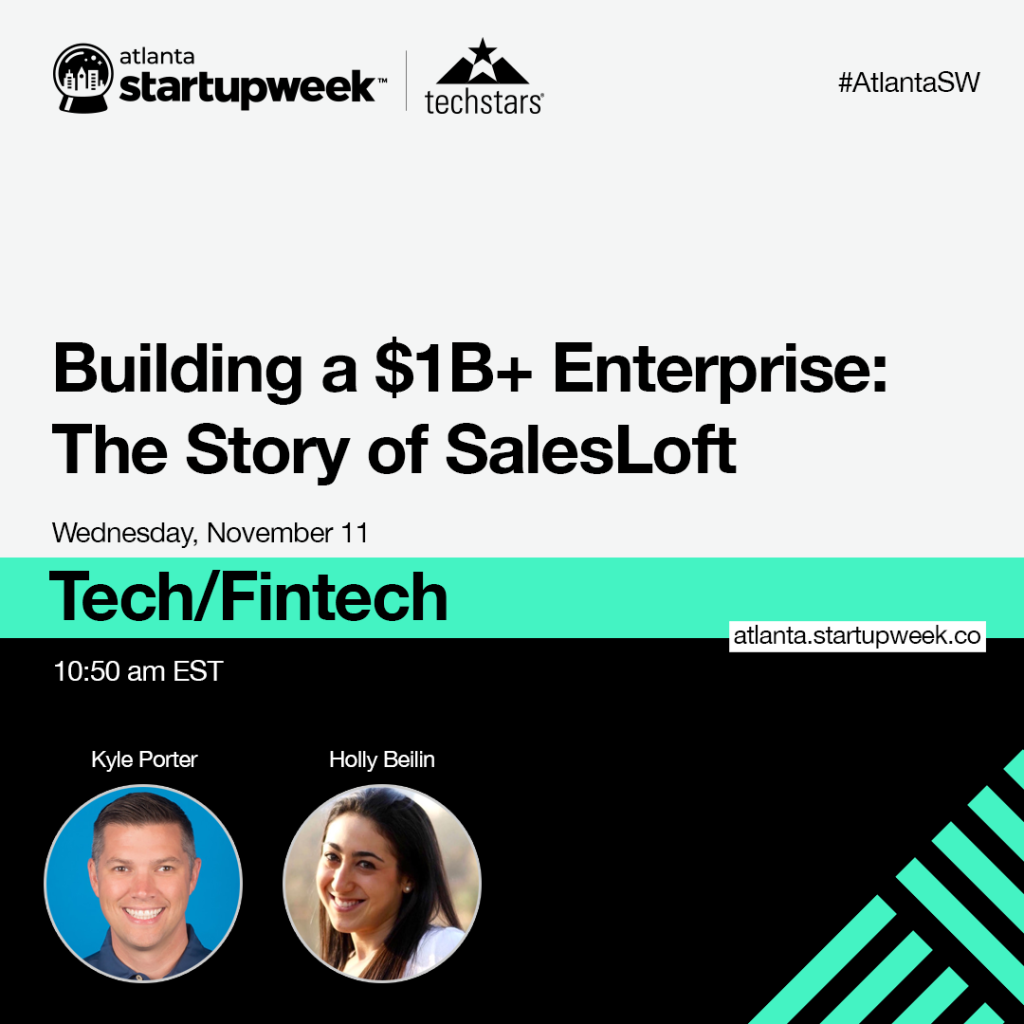
In the middle of the day, we were able to have an invaluable pre-lunch session with SalesLoft founder & CEO Kyle Porter and Holly Beilin (who for the record, is a killer tech writer here in Atlanta!). Kyle broke down the basic components of how Salesloft got off the ground and indicated some of the key tactics that could help other founders build a massively successful B2B SaaS company. It was great to hear some of the more nuanced portions of Kyle’s journey; full credit to Aly for setting this block up!
Show Me the Money: What to Know About Funding and How to Raise Capital
Featuring: Asia Orangio, moderator (DemandMaven), Karen Houghton (Atlanta Ventures & Atlanta Tech Village), Jen Bonnett (The Creative Coast & Savannah Economic Development Authority), & Charlton Cunningham (HBCUvc)
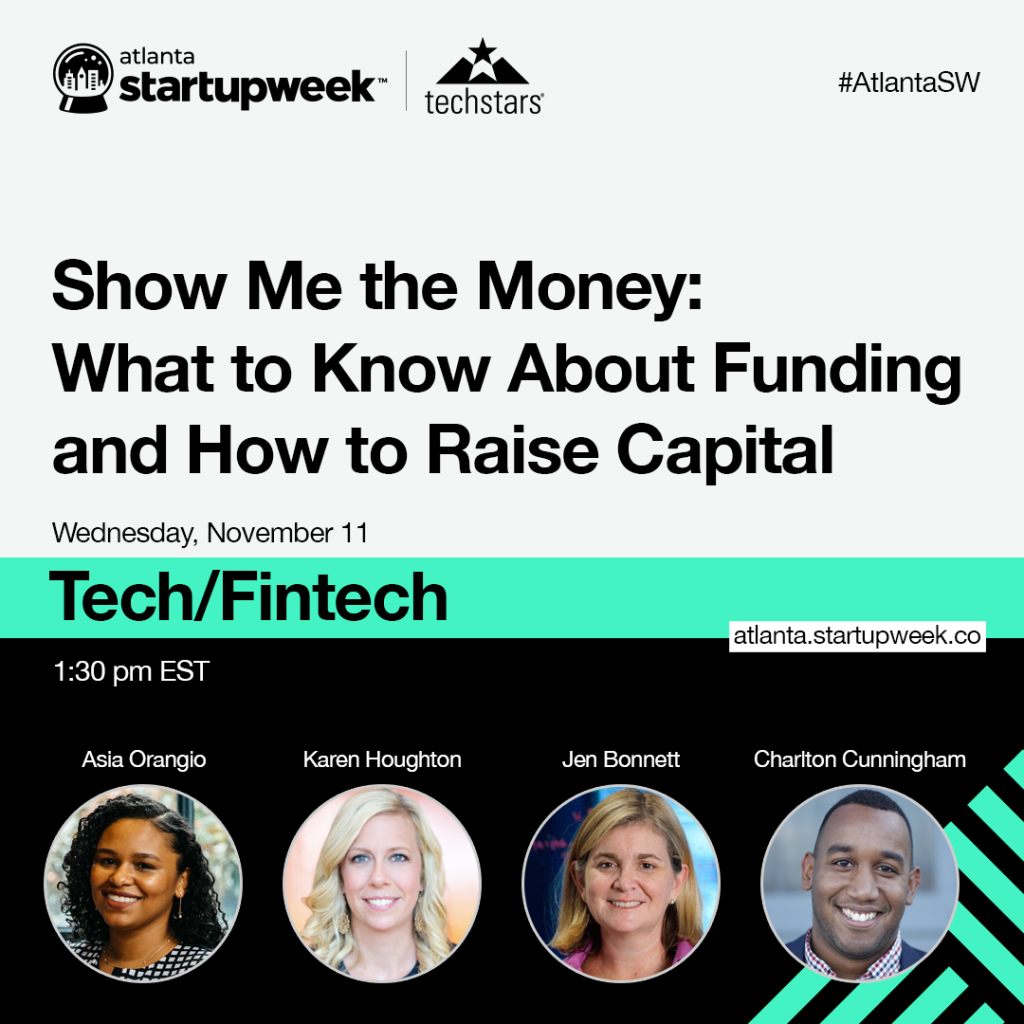
And we capped Wednesday with a killer discussion from some of the most well-known funding names in the Atlanta tech scene. Moderated by the incomparable Asia Orangio, the knowledge dropped by Karen, Jen and Charlton was almost a how-to regarding fundraising presented by a who’s who of Atlanta knowhow. Definitely one of the panels we were thrilled to have on-board, and again, credit due to Aly for taking the reins here to pull together a magnetic discussion.
Thursday
Thursday, November 12th was one of the only times we ran into minor technical issues—pretty good for a virtual tech event! Initially, we had Ruben Harris and Erica Stanley scheduled in the morning, but technical glitches moved their talk on non-traditional paths to engineering to Friday (we were so grateful for their flexibility and understanding!). So we moved on to a phenomenal discussion later in the day on the no-code movement, hearing from two no-code influencers!
Speak in No-Code: The New Movement
Featuring: KP (Karthik Puvvada) (On Deck & No-Code influencer) & Lacey Kesler (Women in No-Code, No-Code community at IndieHackers & the Visual developers Podcast)
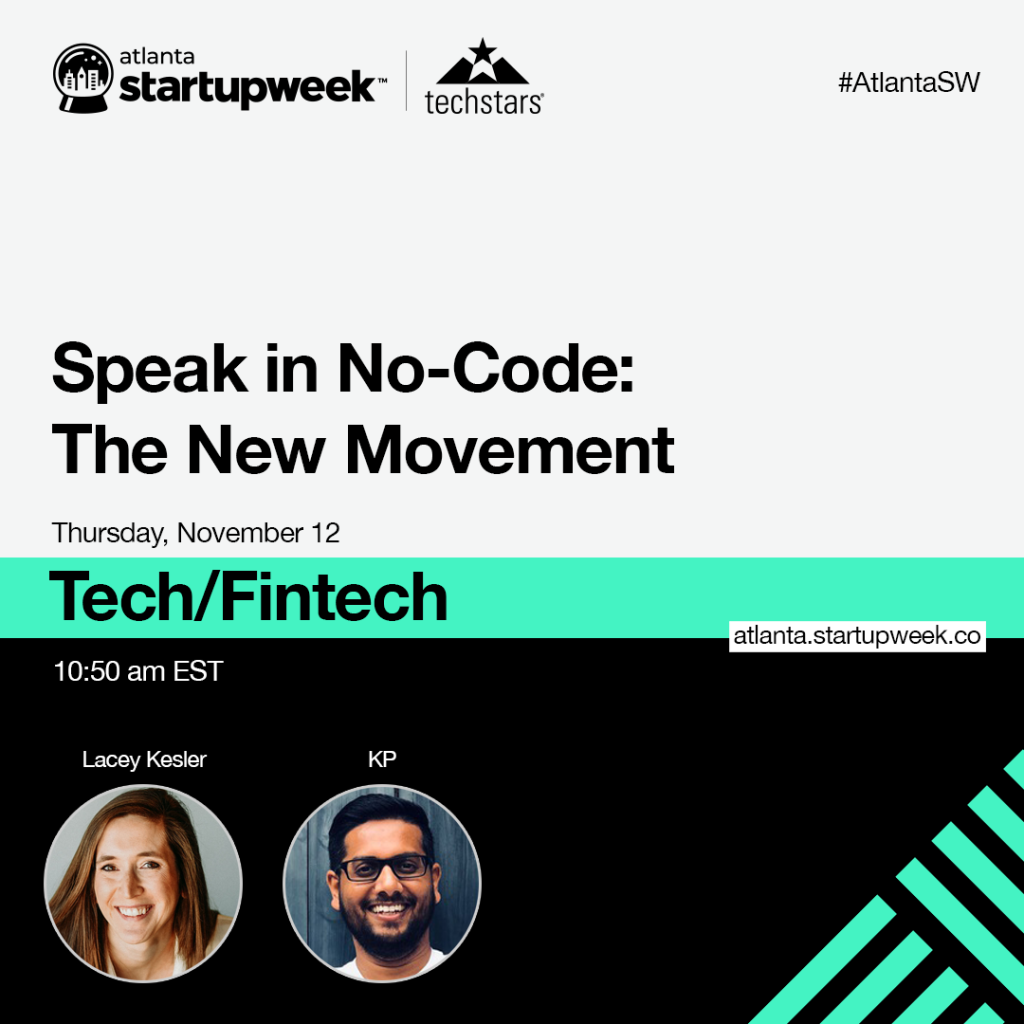
No-code is blowing up, especially here in Atlanta. That was my line of thinking when I worked with Aly to recruit KP and Lacey Kesler—two of the leading voices in no-code—to have a discussion about the new movement. Their discussion of the possibilities of new no-code applications, as well as the potential for growth of the no-code communities, made this dialogue immensely engaging. Having known KP for years now, it’s been especially intriguing to see the focus he’s helped bring to no-code in Atlanta!
Friday
Friday, November 13th was our wrap-up day for the event, but no less busy or engaging! Aly and I were immensely grateful that Ruben Harris and Erica Stanley took time out of their schedules (again!) to come back and have a chat about non-traditional engineering after some minor technical glitches on Thursday. Their talk seems especially timely given Career Karma’s new Series A raise! Then in the late morning we switched gears and focused on branding and marketing strategies that can expand your sales funnel. Not a bad way to end a week of great content!
The Code Less Traveled: Non-Traditional Paths to Being an Engineer
Featuring: Ruben Harris (Career Karma & Breaking Into Startups) & Erica Stanley (Mozilla & Refactr)
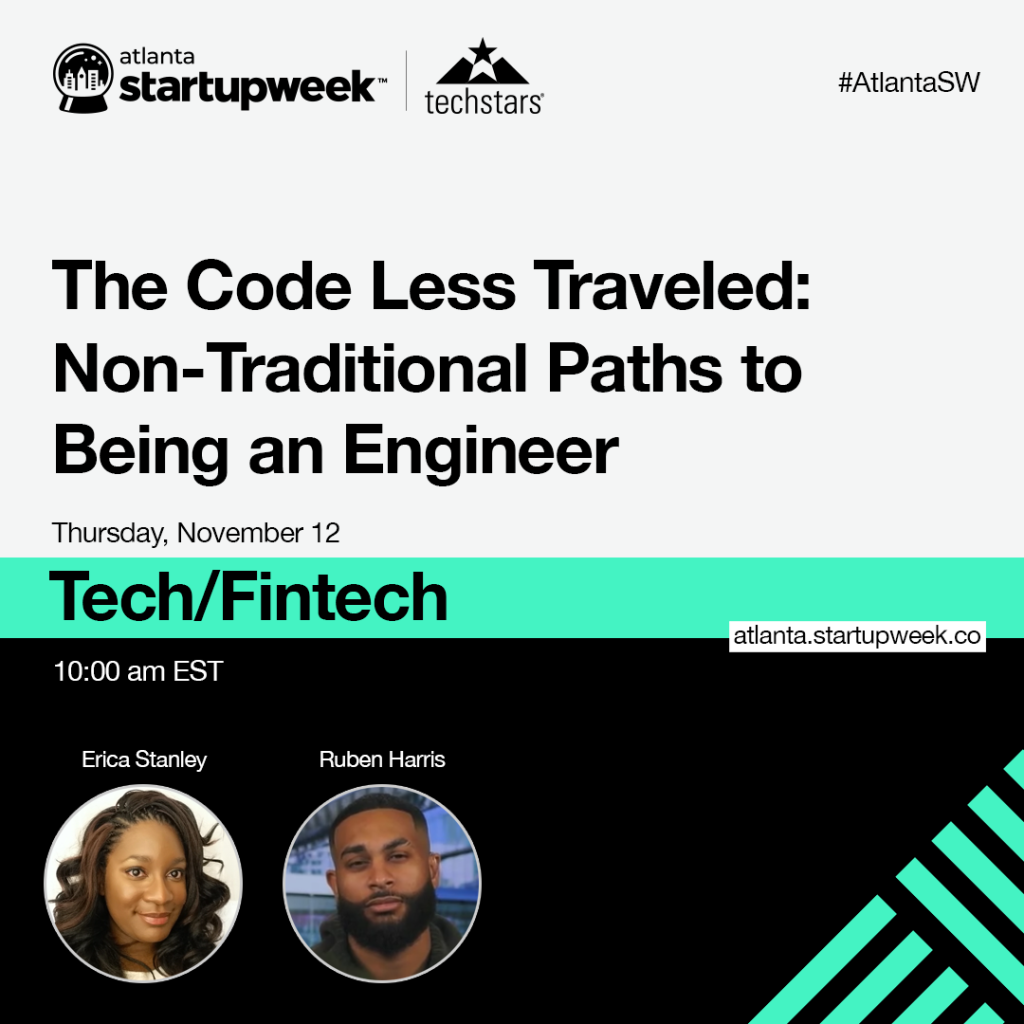
Despite some minor tech glitches, Ruben and Erica generously came back Friday morning to kick off our last day with a killer chat. They covered topics like education and non-traditional paths to landing an engineering job. Whether at a startup or large company, with the pandemic making distributed work especially necessary, more and more people are looking for ways to get their foot in the engineering door. Their talk seems especially timely given Career Karma’s new Series A raise!
Appetite for Construction: Building a Brand for Your Sales Funnel
Featuring: Judi Fox (Executive coach & LinkedIn influencer) & Dale Dupree (The Sales Rebellion, Selling Local Podcast, & LinkedIn influencer), &….surprisingly me haha! (See Tuesday’s details; I was able to hop into this conversation at the last minute and I’m glad I did!)
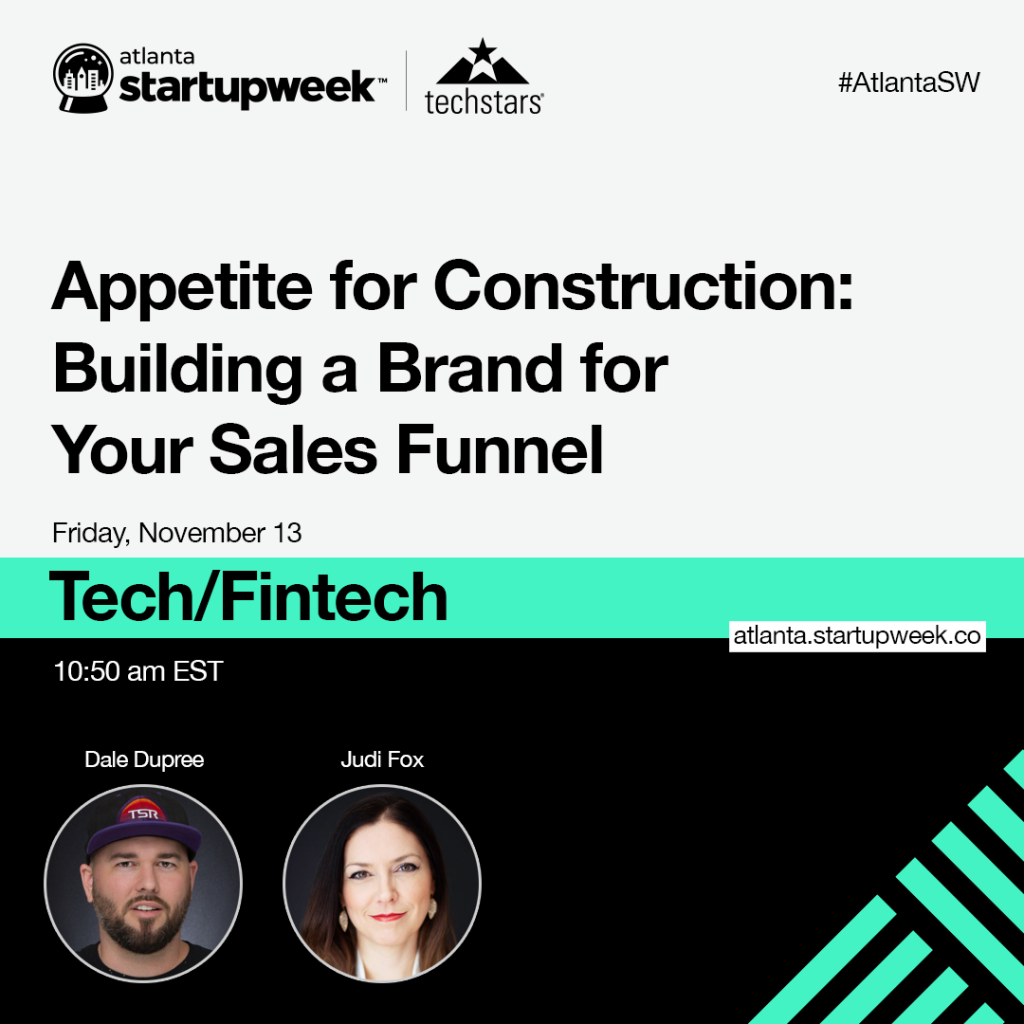
Then we switched gears and dove right into branding & marketing with Dale and Judi, two super well-known influencers and branding experts on LinkedIn. In a funny twist of serendipity, they invited me to join their live chat and we discussed the dynamics of great networking (see my previous Tuesday panel 😄) against the dynamics of positive branding and successful marketing. Couldn’t have asked for a better discussion to be a part of on the last day!
Brand + Go to Market Strategies: Your Most Valuable Asset
Featuring: Tami McQueen (31south & B2B SaaS advisor)
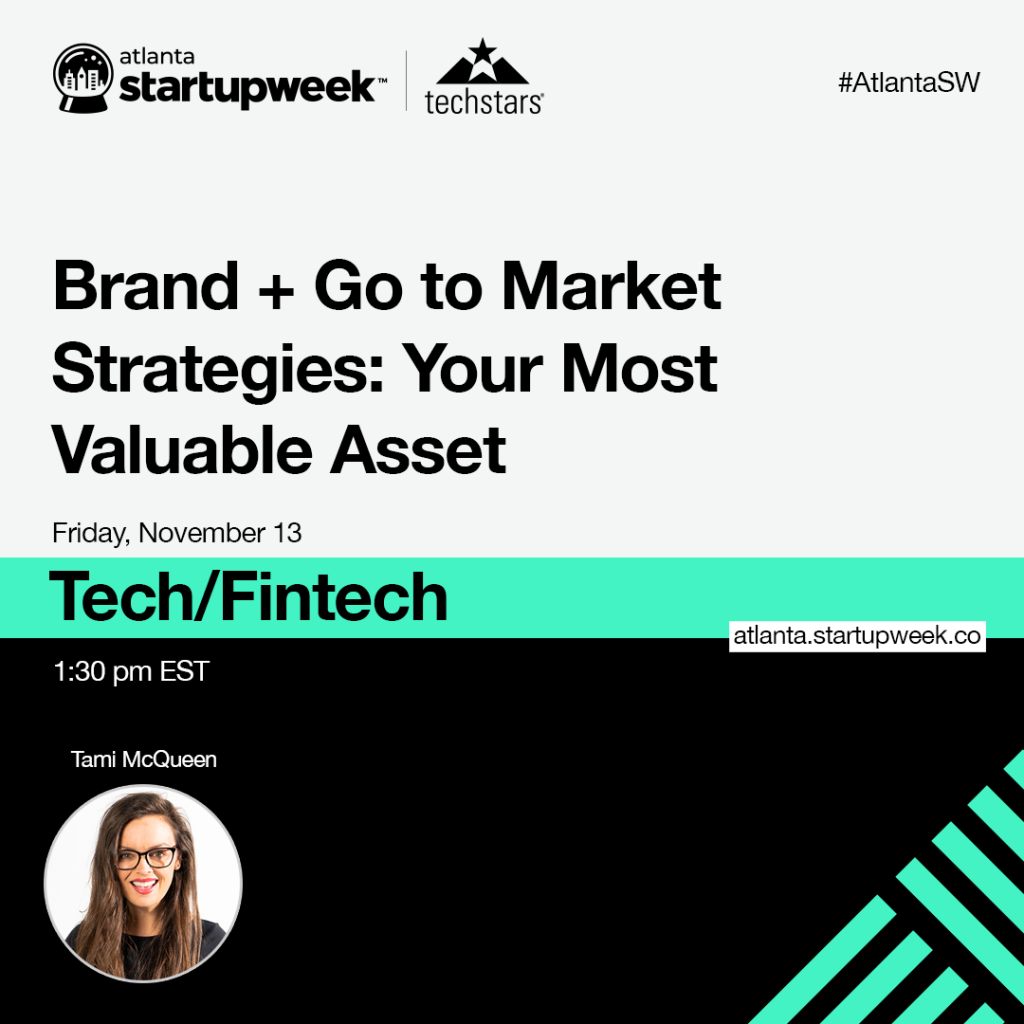
We wrapped up TechStars’ Atlanta Startup Week with a brilliant presentation from Tami McQueen, well-known in the Atlanta startup community. Her discussion around go-to-market strategies within one’s branding provided great, actionable content that guests hopefully came away with!
Looking Forward to the Next Atlanta Startup Week
Lastly, I want to give recognition to all the other amazing track captains that were doing work simultaneously as Aly & I put our own speaker list together.
Track: Corporate Innovation
Captains: Anita Morea, Noelle London, & Travis Kupp
Track: Creative Industries
Captains: Delroy Dennisur, Sheyoki Jones, Paul Ford, & Shayne Veramallay
Track: Entertainment/Sports
Captain: Ryan Bell
Track: Social Impact
Captains: Sydney Hulebak & Unshu Biyani
Track: Inclusive Innovation
Captains: Blanca Garcia & Joey Womack
Side-note: I was also super humbled to be invited by Joey to speak about networking (my segment starts at 5:23:00) at his Goodie Nation virtual #GivingTuesday event a few weeks later!
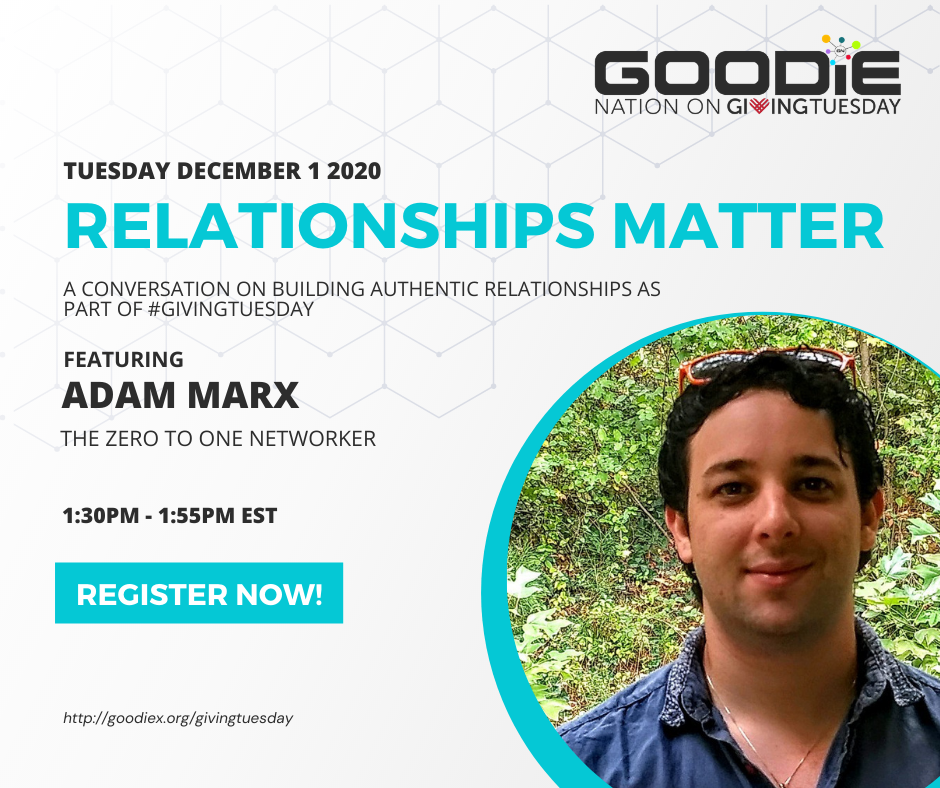
As well as Riya Santra (Technology Lead), Briana Wills (Partner & Sponsorship Lead), Nolan Jones (Budgeting Lead), Anjali Bhole (Marketing Lead), Carlos Pacheco (graphics and design), & Ryan Peppenhorst (Traffic Controller).
And certainly to our corporate sponsor for the Tech/Fintech track, Invesco!
I’m excited to see what the long-term feedback will be on all of the speakers and panels; I definitely think that TechStars will continue to see engagement on the content in the coming months. As we speak, I’m drafting out some emails to send out to the TechStars people after the holiday season to see how we can continue to get these high-quality talks in front of new founders & VCs who would surely appreciate them. 2020 was a hard year indeed, but this was certainly one of the bright spots for me. I added numerous positive and inspirational people to my network, created some (hopefully) killer content, and learned a boatload from a variety of experts across an array of disciplines.
I’m looking forward to next year and hoping we can top it all in 2021.
Have a great New Years!
*****
Want more networking and branding tips? Follow me @adammarx13 on Twitter, LinkedIn, etc.
And take a peek at my new initiative, The Zero To One Networker!
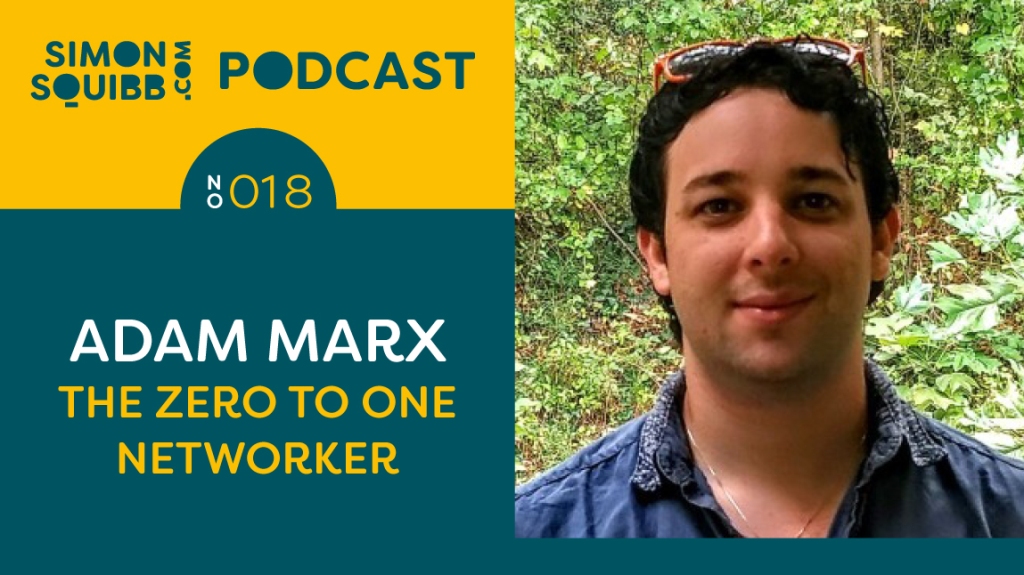
Just #LookForTheOrangeSunglasses. 😎
If you’re looking to have more conversations around networking and building concrete relationships, ping me and let’s chat! I’m looking forward to picking up new clients and recording more podcasts in the new year. Anyone can be a powerhouse networker—that’s my philosophy behind the Zero To One Networker. 🚀
I’d love to be on your podcast so let’s chat! 🎙️


